An Indiana law aimed at prohibiting abortions based on gender, race or disability is going into effect after a federal judge lifted an order first issued six years ago blocking its enforcement.
U.S. District Judge Tonya Walton Pratt granted an order Monday removing her injunction that was sought by the Indiana attorney general’s office after the U.S. Supreme Court’s decision last month to allow states to outlaw most abortions.
The American Civil Liberties Union of Indiana had successfully sued to block the law after it was adopted by Indiana’s Republican-dominated Legislature in 2016, but it conceded defeat in light of the Supreme Court ruling.
Then-Gov. Mike Pence signed the law, which includes a ban on abortions sought because a fetus has a genetic abnormality such as Down syndrome. The law allows doctors who perform abortions in such cases to be sued for wrongful death.
A previous appeal by the state seeking to enforce the law was rejected by the U.S. Supreme Court in 2019. But that was before former President Donald Trump’s nomination of Justice Amy Coney Barrett strengthened the court’s conservative majority.
Another federal judge has lifted similar rulings against Indiana anti-abortion laws in recent weeks, ahead of the state Legislature meeting in a special session starting Monday during which action is expected on additional abortion restrictions.
 DONATE
DONATE







 Support WFYI. We can't do it without you.
Support WFYI. We can't do it without you.